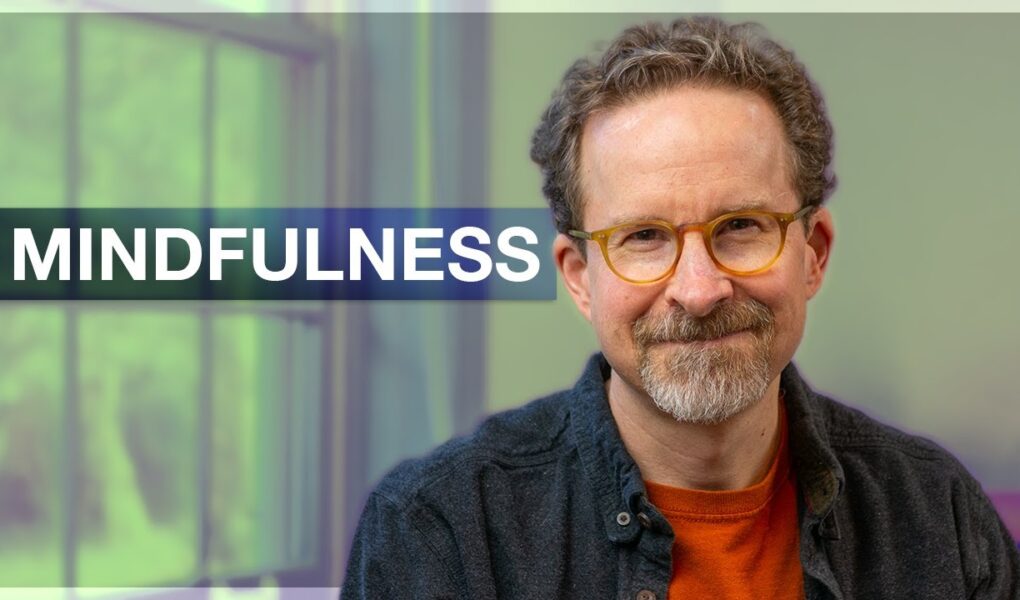Doug’s Dharma
Have you heard of “mindfulness” but don’t know what it is or why it’s important? We’ll discuss all that in this video.
☸️ Free mini-course at the Online Dharma Institute: onlinedharma.org.
🧡 If you get benefit out of these videos, consider joining us on Patreon and get fun benefits like exclusive behind-the-scenes videos, audio-only versions, and extensive show notes: https://www.patreon.com/dougsseculardharma
🧡 You can also make donations through: https://paypal.me/dougsdharma
✅ Some good intro books on mindfulness:
Bhante Gunaratana, Mindfulness in Plain English https://amzn.to/30m7Nvn
Thich Nhat Hanh, The Miracle of Mindfulness https://amzn.to/308ZOGP
Joseph Goldstein, Mindfulness http://amzn.to/2mC8OgY
✅ A more scholarly treatment of the original sutta on mindfulness:
Anālayo, Satipaṭṭhāna http://amzn.to/2DCty05
✅ The original sutta on mindfulness meditation (The Four Foundations of Mindfulness): https://suttacentral.net/mn10/en/sujato
✅ My playlist on the Four Foundations of Mindfulness: https://www.youtube.com/playlist?list=PL0akoU_OszRjItCXmF-MMPdKwTdtGSxl-
Facebook: https://www.facebook.com/onlinedharmainstitute/
Twitter: https://twitter.com/dougsdharma
❤️ Thanks to Patrons:
Matthew Smith
Kathy Voldstad
slidnbob
Thissapunyo
JC
Pritom Phookun
Shantha Wengappuli
poikkiki
jonitomato
Margo
Karma_CAC
Johan Thelander
Michael Roe
Joseph Kingsley
Jorge Seguel
#onlinedharmainstitute #buddhism #earlybuddhism #secularbuddhism
Disclaimer: Amazon links are affiliate links where I will earn a very small commission on purchases you make, at no additional cost to you. This goes a tiny way towards defraying the costs of making these videos. Thank you!
Source



If you'd like to learn more about early Buddhism from a contemporary perspective, check out these courses for a deeper dive into the dharma: https://onlinedharma.org !
I was living in the past but I need to move on and letting go of haunting memories
I also now use a mindfulness meditation, and it actually helps me sleep better
Thank you so much for including us and showing us all these amazing tips and tricks about mindfulness. I really need it.
1st time I saw ur vdo & when I saw ur vdo i was really surprised bcz of ur precious explanations,It really helps me a lot ! Thn I subscribed ur channel and add me a new member in ur youtube family.Watching ur vdo from Bangladesh.Pray for me! May Allah bless u.Thanks !
Thank you! Your talk on mindfulness is helpful this morning.
I think it funny having a mom that a psychiatrist she doesn't even have mindfulness and defend 2 children out of 4
Ironically this video makes me think of the hardest year I've just had and how I can approach it differently
Thank you so much for this video, Doug. I love to write and my ear was snagged by your use of the word 'story' in this video…. thinking of meditation as a kind of ceasing of mental 'storying' of the past moments or imagined future moments was a real lightbulb moment for me! For one, it's made me realise why my mind is so tired – I feel like I am constantly 'storying' my past or my future. What a great insight that is. Now I feel like I have a way in to mindfulness for the first time. Much appreciated.
I find that there is tension when trying to return to the breath, my mind and body protest as though it wants my attention to be on the distracting object (pure bodily sensation, emotion ect) and NOT return to the breath. It's only once the sensation has ebbed away may i return to the breath and even still it's not an effort on my part, it's rather than the sensation clears like fog, and beneath it is the breath. Is this correct ?
Another issue is the distinction between focusing on the breath vs returning to the breath. The former is akin to focusing on a point, rooting it there attempting to stop it removal which is what i think of when i hear 'focus on breath' the latter is an almost careless attitude, wherein it's almost as though i'm viewing a field of contents in my mind and alongside them is the breath which sometime grabs my attention, but otherwise there isn't any 'focusing' as the word 'focus' is traditionally understood. It feels like mind wandering where occasionally my breath, rather than objects of thought is the main focus.
Put differently, the only form of meditation that feels intuitively right isn't what i would refer to as focusing per say but instead having both my breath and everything else in mind almost simultaneously, like i'm in a dome, with my breath in the center and all the other contents kind of drifting across it where i'm partially aware of both and rarely fully focused on either, it's kind of like my breath rises to the fore rather than me seeking it out to focus on it. There seems to be an apparent contradiction between 'sitting with the thought/sensation' and 'return to the breath once you've noticed a thought or sensation', because it raises the question of whether i remove my attention from the distracting thought/sensation and replace it on the breath or i let it pass after which is almost naturally finds itself on the breath.
This is the only way I can get back to sleep after waking around 2-3am. I just have to take a mental note to deal with my “to do” list the next day and simply focus on breathing and the comfort of my bed. It’s not easy.
💙 Namo Buddhay 💙 Jay Bhim 💙
This is the best explanation of mindfulness. Thank you, Doug!
Living in the present seems to be a simple process but as you explained so much information available on the internet and just getting caught up on regrets from the past and not knowing where to actually go in planning for the future has me ignoring the present. Thank you for starting me on this journey of being consistent in living in the present
disconnect from stress to begin with
On Mindfulness, motivation, and pleasure: a different procedure and perspective from affective neuroscience
Procedure: Consistent and periodic alternation between a resting protocol (e.g. mindfulness) and the exclusive pursuit of meaningful behavior will increase motivation and positive affect (arousal and pleasure), and by making meaningful ideation more emotionally salient, will increase productive motivation and crowd out thoughts leading to anxiety and depression.
Explanation: Resting elicits opioid activity, or feels pleasurable, and meaningful behavior, as defined as behavior that has branching novel and positive outcomes (writing that great novel or just making the bed) elicits dopamine activity which causes attentive arousal. The awareness of subsequent meaningful behavior while engaging in relaxation protocols such as mindfulness elicits a ‘priming’ response, namely dopamine release that enhances ongoing opioid activity, and vice versa, making meaningful behavior seem self-reinforcing or ‘autotelic’, with cognition less likely to transition to perseverative thought (worry, regret, distraction). In other words, arousal and pleasure (i.e., dopamine and opioid) systems when simultaneously activated by disparate stimuli are synergistic, and co-activate each other to be more than the affective sum of their parts
Although meditative practice reduces discursive thought or mind wandering that can lead to negative ideation or perseverative thought (worry, regret, distraction); it does not inhibit concurrent non-conscious awareness or anticipation of behavior or events subsequent to meditation that can in turn shape or ‘prime’ affective responses during a meditative session. A priming response, like the salivary response that precedes food or the sexual arousal that precedes intimacy, is a preparatory response that often occurs non-consciously, and changes the affective value or ‘feeling’ in the moment. Similarly, relaxing due to ‘being in the moment’ is pleasurable, but if we were told to expect ‘bad’ news or ‘good’ news in the near future, just the awareness of future events is enough to depress or elevate our feelings, but not altering in the slightest our ‘mindful’ or relaxed state. It follows that if mindfulness is paired with the awareness of subsequent positive or meaningful behavior, then rest in mindfulness will have a greater affective tone or ‘feel better’ than if such a prospect or expectancy was absent. This is perhaps why ‘savoring’, ‘loving kindness’ meditation, and ‘flow’ experiences represent highly pleasurable and arousing experiences, as they make future positive ideation contingent to obvious or subtle pleasures (due to relaxation, eating, drinking) and contrast with a lower level of pleasure during typical states of rest that generally precede a return to meaningless discursive thinking.
From ‘the book of rest, the odd psychology of doing nothing’ from the open source publishing web site scribd
Thank you, Doug!
I do not know why people in videos talk too much before giving just little useful informations. 99% definitions and obvious facts, VS 1% useful practical tips. But audience time is precious, isn't it?
How important is having a solid foundation of knowledge of Buddhist philosophy for a beginner like me? I've buried myself under Wikipedia tabs and a backlog of books, and I'm afraid that if I don't consult as many sources as I can, my effort will be in vain.
Ironically this video makes me think of the hardest year I've just had and how I can approach it differently
You speak of this as if it's the easiest thing in the world 😂 It's actually quite hard for me. My yoga instructor calls it "monkey mind" bouncing around making mischief 😂 For me. It's been one of the more challenging aspects of my practice but every day i wake up and keep trying to wrangle the monkey mind 🙂
When should i set a schedule for mindful meditation? And for long time should i meditate exactly?
Such a foundational and practical lecture…i seem to return to this video every so often when my mindfulness needa a refresher. ❤
Thank you so much for this video, Doug. I love to write and my ear was snagged by your use of the word 'story' in this video…. thinking of meditation as a kind of ceasing of mental 'storying' of the past moments or imagined future moments was a real lightbulb moment for me! For one, it's made me realise why my mind is so tired – I feel like I am constantly 'storying' my past or my future. What a great insight that is. Now I feel like I have a way in to mindfulness for the first time. Much appreciated.
Something that I find very interesting is that language is just a means for humans to communicate with eachother, but it is very flawed. And yet when we talk to ourselves we use language. It begs the question, should we even talk to ourselves at all? For this reason I don't see what mindfulness has got to do with labelling anything. If anything you're trying to take your voice out of your head, surely?
Sir please guide I have doubt in my mind that in my practice Do I have to be only aware of the thoughts or do
investigation of thoughts?
My thoughts are so well disclosed and hidden that it goes rite along with my mantra when doing TM and breath when doing anapana .